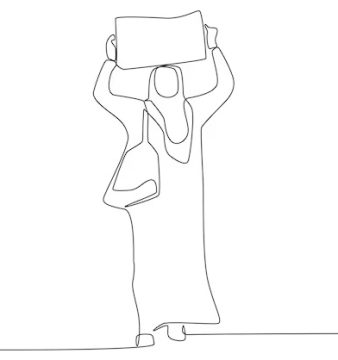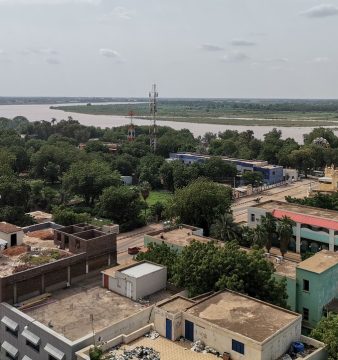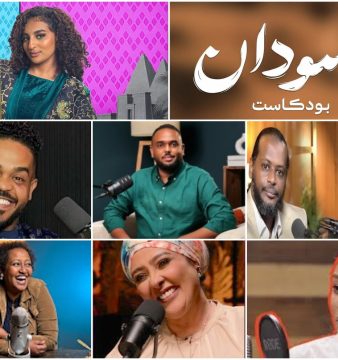Palestinian-Sudanese Voices of War: Witnessing War in Sudan and Palestine
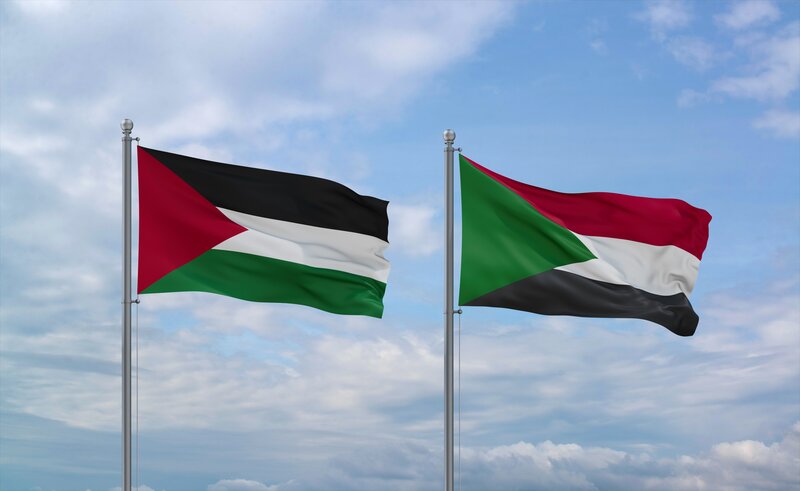
Recently, major armed conflicts and war have been taking place around the world from Europe to Africa to the Middle East, shaking up the world we live in today. Just as the world began to pull through from the Russia-Ukraine War that began in October 2022, a war began in Sudan in April 2023, which the United Nations (UN) is calling one of the worst humanitarian nightmares in recent history. Now, the world’s attention is on yet another humanitarian nightmare, a reignited war between Israel and Hamas, resulting in significant casualties, destruction and displacement.
War in Sudan erupted in 15 April 2023 between the Sudanese Armed Forces (SAF), led by the de facto ruler of Sudan General Abdel Fattah Al Burhan, and the paramilitary Rapid Support Forces (RSF), led by the leader of the RSF, Mohamed Hamdan Dagalo (Hemedti). At least 9,000 people have been killed and more than 7 million have been displaced. At least 3 million people have been internally displaced, and at least 4 million have fled the country to neighbouring countries such as Egypt, Chad, South Sudan and Ethiopia.
On 7 October 2023, Hamas launched a series of coordinated attacks from the Gaza Strip onto bordering areas in Israel, killing more than 1,400 in Israel, which resulting in Israel retaliating by escalating its crackdown on the Gaza Strip, killing more than 8,000 Palestinians, including 3,195 children. More than 1.4 million people in Gaza have fled their homes. This is the most violent war that has taken place in the history of Israel’s 50-year-long occupation of Palestine.
For many Palestinian-Sudanese and Palestinians who have resided in Sudan, this year has been nothing short of a nightmare, witnessing suffering in two of their homelands.
‘Conflict and destruction share similarities across the world, resulting in a massive loss of life and devastation. The conflicts in Sudan and Palestine, despite differing causes, have shown some commonalities in their impact and the suffering they’ve caused in both nations,’ said the 23-year-old Palestinian-Sudanese writer and poet Ibrahim Hafiz.
‘This time, the pain has become indescribably compounded because I have family in Palestine enduring the hardships of conflict, and another family in Sudan suffering the treachery of bullets’
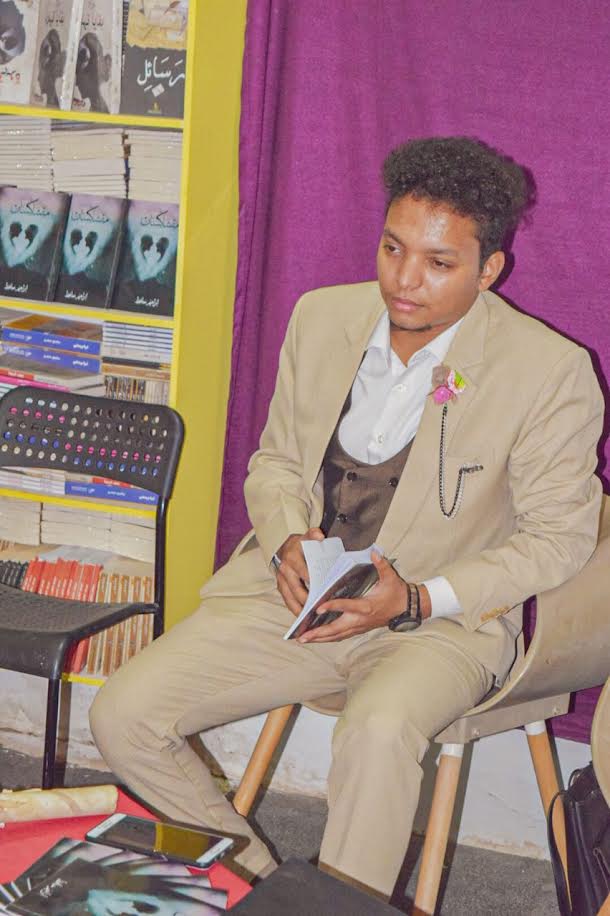
‘The recurring scenario in Palestine has long preceded the recent wounds of modern Sudan, so it didn’t come as a surprise to me. However, this time, the pain has become indescribably compounded because I have family in Palestine enduring the hardships of conflict, and another family in Sudan suffering the treachery of bullets,’ he added.
‘One of the harshest experiences that can be spiritually devastating is going through a war in your own country, where all your memories are destroyed, burnt, and faded away for the sake of personal interests. The least I can describe this war is as a catastrophe,’ said Ibrahim.
Due to the ongoing war in Sudan, many Palestinians have had to leave behind yet another home.
Ibrahim was born to a Palestinian father and Sudanese mother. His half-sister, 30-year-old Tasneem Hafiz, was born to Palestinian parents but holds the Sudanese nationality, and has been residing in Sudan for 29 years. ‘My family left Palestine before I was born. But the Palestinian way of life—including its food, traditions, accent, and other aspects—was passed down to us as a legitimate form of resistance to protect Palestinian culture and pass it across generations even if they lived outside of Palestine,’ she explained. Sudan is where she has been raised and when war broke out in Sudan, she witnessed it firsthand. ‘A truly horrifying experience by all measures. The idea of being removed from your home and losing your entire life in all its forms is painful, let alone the pain and fear for your loved ones and friends in the midst of events,’ she said. ‘Even though I did not personally witness my family’s relocation from Palestine and instead learned about it from them, [escaping] the war in Khartoum was like having a flashback of my family’s migration from Gaza. I had two distinct feelings of sadness: first, the conflict in my home Sudan and its aftermath. And the other since I had to experience the agony, harshness, and sense of being immigrant once more,’ said Tasneem.
‘Even though I did not personally witness my family’s relocation from Palestine and instead learned about it from them, [escaping] the war in Khartoum was like having a flashback of my family’s migration from Gaza’
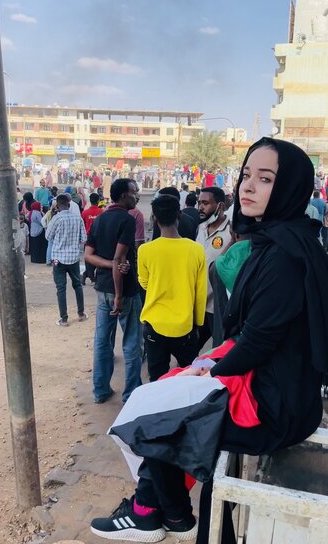
From Khartoum, Tasneem fled to Istanbul, Türkiye where her relatives resided and luckily, she already had a valid multiple entry visa to the transcontinental country.
Prior to the war, Tasneem lived a full life in Sudan with family and friends, working as full time senior application security at DAL, the leading and largest private company in the country, operating across several business sectors including food, agriculture, automobile, engineering and more. She was an active member of society, joining many of Sudan’s protests throughout the Sudanese Revolution in 2019, which ousted former Sudanese President Omar Al Bashir and during Al Burhan’s military coup in October 2020, dissolving a ruling council in which the army and civilians had shared power, and throwing the country’s democratic transition into turmoil. She has joined many pro-Palestine protests that have taken place in Sudan during any turmoil in Palestine. ‘We marched for the Palestinian cause proudly wearing my kufeya and I marched for Sudan proudly wearing my white Sudanese toub. But, the most important thing Sudan gave me is the sense of belonging. In no way have I ever felt like I’m not a Sudanese,’ she explained.
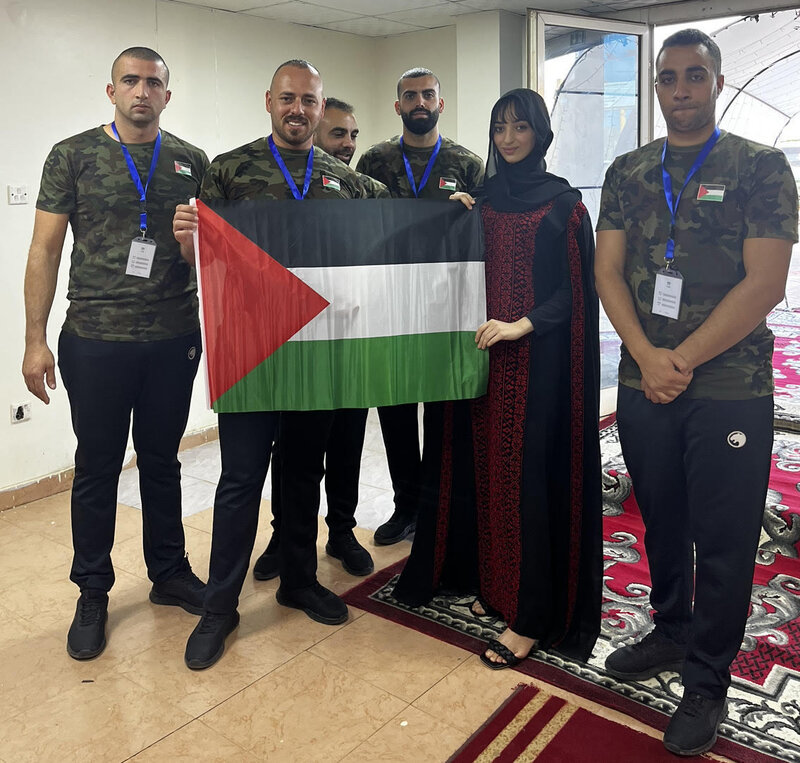
19-year-old Palestinian-Sudanese Dana Shalayel was raised in Sudan and when war broke out in the country, they fled to Egypt, joining more than 350,000 people. ‘I never expected in my life I would witness a war in Sudan. It’s really heartbreaking seeing people losing their homes and their life. We thought it won’t take long. It’s mentally straining waiting for the unknown. We had hope everything will be okay back then as we were patiently waiting for all of this to stop. It never did and things were getting worse. That’s when we decided to flee home,’ said the half-Palestinian half-Sudanese Dana.
Sudan and Palestine: Same but different
Although small and not as big as the Syrian, Jordanian and other Levant communities in Sudan, there is a Palestinian community in Sudan, who have escaped the Israeli blockade of Gaza many years ago to build a life in Sudan. Many Palestinians reside in Sudan to study and work.
The two countries form part of the Middle East region, and share strong religious and cultural values. Although Sudan and Palestine share almost identical flags that are commonly and easily confused with each other, they are two very different countries from different continents fighting different wars.
Being half-Palestinian and half-Sudanese, Ibrahim witnessed firsthand what brings the two countries together. ‘It’s clear that there are significant similarities between living in Sudan and Palestine, as both nations share a strong Arab and Islamic identity, along with numerous common customs and intertwined cultures. Additionally, the warm and welcoming nature of the Sudanese people, who do not discriminate and are not racist, adds to the connection. It’s heartening to know that when they discover your Palestinian roots, their affection and inclusiveness grow. Indeed, when highlighting similarities, both Sudan and Palestine are known for their hospitality, a willingness to help others, and the intelligence of their people. As for differences, some variations may exist in cultural customs and traditions, such as cuisine and attire, which are influenced by their unique regional backgrounds,’ he said.
‘I can’t speak about the similarities between Sudan and Palestine without mentioning the shared beliefs of courageously and tirelessly fighting against tyranny and injustice’
Although Palestinian, Tasneem has lived in Sudan for 29 years, nearly all of her life, and has Sudanese family members, including Ibrahim. ‘We both, as nations, share the same values of generosity, kindness and bravery. The only kind of living I have experienced and become accustomed to is in Sudan is people are incredibly pleasant, modest, loving and simple with no complications, and hospitable,’ she said. ‘I can’t speak about the similarities between Sudan and Palestine without mentioning the shared beliefs of courageously and tirelessly fighting against tyranny and injustice,’ she added.
‘Palestine is home to me. It’s in my heart. Sudan is where my life started and the place where I learned everything about life…I love both of my countries and may god protect us all’
Similarly, Dana believes Palestinians and Sudanese share similar characteristics and values. ‘People from both countries are known by their generosity and hospitality,’ she said. ‘Sudanese homes are always ready to receive an unannounced guest with the best kind of hospitality, and that reminds me a lot of Palestinian culture. Both cultures extremely adhere with their norms and values. For me, I experienced and lived with two different cultures and I had to assimilate both. Palestine is home to me. It’s in my heart. Sudan is where my life started and the place where I learned everything about life and met my people, friends and family so that’s home to me as well. I love both of my countries and may god protect us all,’ she added.
Having been educated in Sudan, Tasneem was proud to see Palestine and specifically Al Quds on the map during her geography class. ‘In the Arab world’s geography, the map had Palestine with its capital being Al Quds written in bold – a map that didn’t have Israel written on it,’ she explained.
The Israel-Palestine conflict

The Israel–Palestine conflict has been ongoing for last 50 years, making it one of the world’s longest continuing conflicts. Palestine has long suffered under the occupation of Israel. The most recent so called Israel-Hamas war that began on 7 October 2023 is one of many.
Weeks after war broke out in Sudan, on 9 May 2023, Israel conducted a series of airstrikes on the Gaza Strip, called Operation Shield and Arrow that lasted for five days until 13 May. The attacks began when the Israeli military killed three suspected leaders of the Palestinian Islamic Jihad movement in a targeted assassination. Ten civilians were also killed. When watching the news of the May 2023 conflict, Tasneem said, ‘The news broadcasters at one point divided the screen into two live streams: Gaza and Khartoum. One of the worst times I’ve ever gone through was this, witnessing my two most cherished cities engaged in a wild war.’
‘I love Gaza and Khartoum equally, so imagine witnessing them both under attack at the same time. My emotions were doubled. The feeling honestly cannot be expressed’
‘For me it was a representation for the division in my heart, identity and sense of belonging. I love Gaza and Khartoum equally, so imagine witnessing them both under attack at the same time. My emotions were doubled. The feeling honestly cannot be expressed. It’s a combination of severe pain, anger, and helplessness that has reached the limit,’ she added.
Dana shares the same sentiment Tasneem feels. ‘When I heard about what has been happening in Palestine recently made me feel homesick. Both my countries are suffering as we all are living with the pain of not knowing when will it end. It’s emotionally draining waiting for the unknown future,’ she said.
Sudan and Israel relations
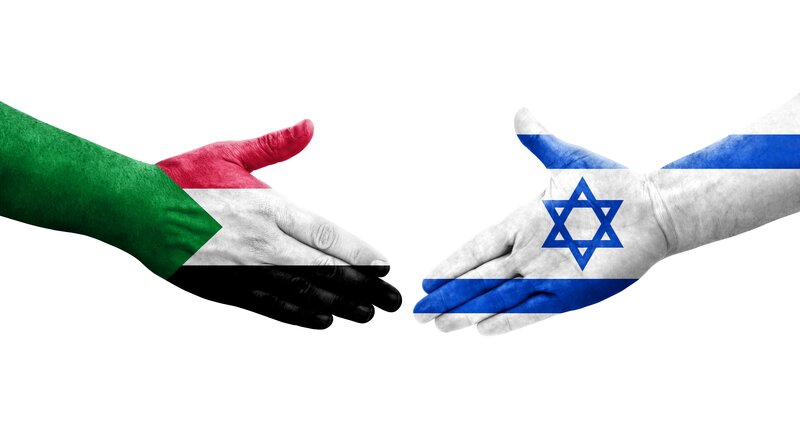
Although Sudan and Israel have agreed to normalise relations in 2020, majority of the Sudan people support the independence of Palestine and condemned their government for normalising relations with Israel. Prior to the war in Sudan, in February 2023, Foreign Minister Eli Cohen visited Khartoum as part of an exchange of visits between Sudan and Israel, and included discussions on reaching and signing a normalisation agreement as well as military and security issues. ‘The signing ceremony is expected to take place after the transfer of power in Sudan to a civilian government that will be established as part of the ongoing transition process in the country,’ said Cohen, who was hosted by Al Burhan during his visit.
‘What hurts the brother most is the strike from a brother, and there’s no pain like a strike from one we trust’
‘When I heard about normalization for the first time, I recalled a verse from the Egyptian poet Alaa Jannib’s poem, where he said, “What hurts the brother most is the strike from a brother, and there’s no pain like a strike from one we trust,”‘ said Ibrahim. ‘This means that a painful blow is even more agonising when it comes from your own brother, not an enemy. However, after a quick look at the countries that have normalised relations with Israel, it becomes evident that the only beneficiary of normalisation is Israel itself. Sudan’s normalisation with Israel will serve primarily Israeli interests, both politically and economically. From a societal perspective, I am confident that the conscious Sudanese society, which has tasted a little of the suffering of war, will not stand with the occupation and will not accept having a normal relationship with it,’ he explained.
‘It was a feeling of sadness and somewhat disappointment,’ said Tasneem about when she first heard the news of Sudan and Israel normalising relations. ‘After everything that has been done with the Sudanese revolution to obtain a free civil government that does not practice any form of injustice and tyranny against its people – this same government comes to normalise relations with the most oppressive and tyrannical entity that exists.’ According to Tasneem, her Sudanese friends were in support of Sudan normalisating relations with Israel. ‘It saddened me even more that many of my friends were supportive of normalisation, thinking that this meant better relations to the government and hence a better life for the Sudanese people. I felt that it was a double standard. The same people who came out to demand “freedom, peace, and justice” are now cheering for the normalisation of relations with an entity that lacks them all,’ she explained.
At home in two countries?
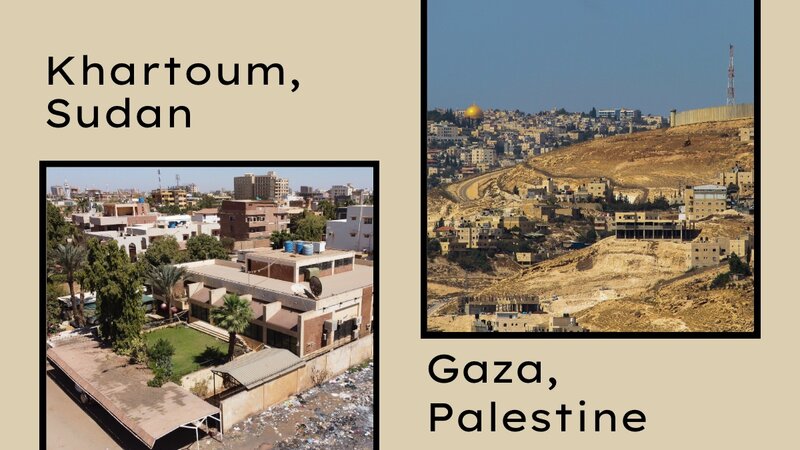
The ongoing wars in Sudan and Palestine have caused catastrophic destruction to each respective country with no peace or end at sight. For many in the world, these wars are just stories they read or see in newspapers, TV or social media. But for Ibrahim, Tasneem, Dana and other Palestinian-Sudanese, these wars are personal and close to home as they witness two of their homelands in turmoil.
‘I think the nearest definition of home to me is Palestine and Sudan. They are home to me’
Now, having to immigrate once more, Tasneem said she has experienced an identity dilemma, and questioned where and what home is. ‘That phase of my life was harsh because it triggered the questions that I have been avoiding for my lifetime. Do I identify as Sudanese or Palestinian? Do I have to pick, since I have always felt both Palestine and Sudan were my countries of origin? Will the third country that I will live in be my homeland as well? And most importantly what is home? Do I feel that my homeland is Palestine because my blood is Palestinian? Does living in Sudan make it my home, or do I feel like it is because of my friends, life, memories, and childhood are in Sudan?’ said Tasneem. ‘I think the nearest definition of home to me is Palestine and Sudan. They are home to me,’ she said.
While thinking of home and where that is, Tasneem shares an excerpt from the novel Returning to Haifa by the late Palestinian journalist, writer and police activist Ghassan Kanafani. Said, the protagonist, asks his wife, Safiyya, ‘Do you know what homeland is, Safiyya? Homeland is where none of this can happen.’
‘I don’t think I can bear the sight of Khartoum, and the destruction that occurred and left behind after the war. I don’t know if the situation will be safe and suitable for living. With all of my heart, I pray that the war ends and that going back to Khartoum becomes a possibility,’ Tasneem said.
‘Certainly, the right to return is fundamental like the sun’s rays’
When asked if he will ever return to Sudan when the war is over, Ibrahim quotes Brazilian novelist Paulo Coelho, ‘”People dream of returning more than they dream of leaving”. This quote reminds us of the significance of returning and the hope for an improved future in our homeland. Certainly, the right to return is fundamental like the sun’s rays,’ said Ibrahim.
In addition, when asked what and where home is to him, Ibrahim quoted the late Palestinian poet and author Mahmoud Darwish, ‘Carry your country wherever you go and be proud of it’ and said, ‘My homeland is me. I express and speak about it, defend it, and convey its voice to the world through writing, poetry and various other means.’ Having dual nationality, Ibrahim is currently in the process of publishing a book he has written about having dual or multiple nationalities, the impact it has on their identity, and the challenges and advantages that revolve around it.
‘Honestly, I can’t wait to go back to Sudan. It’s the place I miss the most. For me, it’s home’
Dana, however, is eagerly waiting to return to Sudan. ‘Honestly, I can’t wait to go back to Sudan. It’s the place I miss the most. For me, it’s home,’ she concluded.

